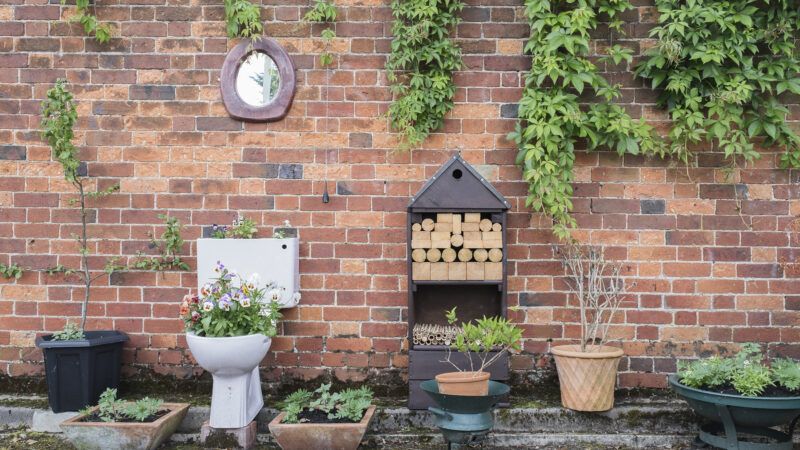Meet the Property Owner Who Created a Toilet Garden to Protest Local Officials
"I have my First Amendment rights," says Hank Robar.

Hank Robar just turned 80, and he's a happy man. The toilet gardens he erected around his hometown of Potsdam, New York, were declared protected by the First Amendment this spring.
Yes, you read that correctly. Robar created his art—fields of toilets with plastic flowers "growing" out of them—to get back at local authorities.
The first seeds of the project were planted in 2004 when local authorities refused to grant Robar a zoning change that would have allowed him to sell some property to a buyer to build a Dunkin' Donuts.
But then, in 2005, a piece of property three blocks away—not Robar's—was sold to a buyer who, by golly, went and built a Dunkin' Donuts.
A little time passed and Robar requested a zoning change for a different lot he owned. According to a long and well-reported piece by Sidney Schafer at NNY360.com, a board member told Robar they weren't going to change the zoning rules for his second lot, either.
That's when Robar decided to express his feelings about the town's leadership, artistically.
He started to put toilets all over his property, and filled them with fake flowers. When he needed more toilets, he went dumpster diving. And when he finished with one garden, he started another, and another.
These porcelain gardens did not sit well with the city elders, who sued Robar for local code violations in 2008. The case was dismissed when the code enforcement officer arrived at court without the documents against him.
Robar continued to frustrate Potsdam's poobahs by creating more and more of his art. Sometimes he added bathtubs and wash basins, but toilets and urinals dominate. "There's one from Clarkson College," Robar tells Reason.
In 2018, the town made one last attempt to dethrone Robar. The board of trustees passed a law against visible junk:
The deposit, accumulation, display and/or outdoor storage of junk, junk appliances, junk furniture, junk mobile homes, junk motor vehicles, garbage, regardless of quantity, is hereby prohibited within sight of neighboring property/properties and/or business concerns.
At that point, said Robar, it was time to sue or get off the pot.
"I hired a lawyer and another lawyer," he says. "I have my First Amendment rights."
That's what his lawyers argued, too, alleging that the junk law was retaliation against Robar's artistic and political freedom of expression. They filed a federal lawsuit against Potsdam for violating Robar's rights, and demanded $7 million in damages.
In February, the town rescinded its junk statute, but the federal lawsuit barreled on. And in April, Robar won his case. "I got a settlement but I can't say what it was," says Robar. "I'm happy with it."
Happy, too, are the tourists who flock to Potsdam, population 15,000, to take selfies in front of those newly minted First Amendment icons. Graduates pose there with mom and dad, says Robar. "I wish I had a dollar for every picture they took."
Instead, he's semi-retired, still working on some of his rental properties, and enjoying his living legacy. "You've got some people, they've got a little authority in a village and they always think they can push it a little further," he says. "But I think now people realize that they do have rights. You just gotta stick up for them."
Or perhaps sit down.


Show Comments (39)